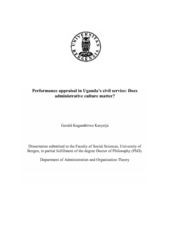Performance appraisal in Uganda’s civil service: Does administrative culture matter?
Doctoral thesis
Permanent lenke
https://hdl.handle.net/1956/3953Utgivelsesdato
2010-02-19Metadata
Vis full innførselSamlinger
- Department of Government [457]
Sammendrag
This study explores administrative culture and examines its impact on the reform ofperformance appraisal in Uganda’s civil service, an area which has received littleattention from researchers. It reveals that Uganda’s bureaucracy is characterized by largepower distance, strong uncertainty avoidance, high ethnicity and political neutrality.Evidence for this study gathered from 147 questionnaires, 29 interviews and variousdocuments for eight months indicates that these cultural variables influence theintroduction of performance appraisal by sabotaging its actual conduct and underminingits institutionalization. The study supports the use of power distance and uncertaintyavoidance by various scholars to analyze the linkage between administrative culture andinstruments of management. The additional dimensions of political (neutrality) biasnessand ethnicity pursued by this study are a highly relevant addition to the literature onadministrative culture, and the linkage between administrative culture and instruments ofmanagement.Findings further indicate that administrative culture in Uganda’s bureaucracy is quiteunified and integrated. Background variables such as age, type of education, duration ofservice, studying abroad, birthplace and gender have limited or no influence onadministrative culture. It is only the level of education which has a strong negativecorrelation, i.e. higher levels of education is associated with low power distance, lowuncertainty avoidance, low political neutrality, and low ethnicity.The thesis argues that for the successful introduction of performance appraisals, culturematters because the performance appraisal is imposed from abroad and requires acompatible host administrative culture in order to take root. In this case, the hostadministrative culture was not compatible in many respects with the values underlyingthe appraisal reforms. Although the Ugandan government successfully introduced theappraisal reforms, the incompatibility between the values embedded in the appraisal andthe host administrative culture watered down the reform.
Utgiver
The University of BergenOpphavsrett
The authorCopyright the author. All rights reserved
